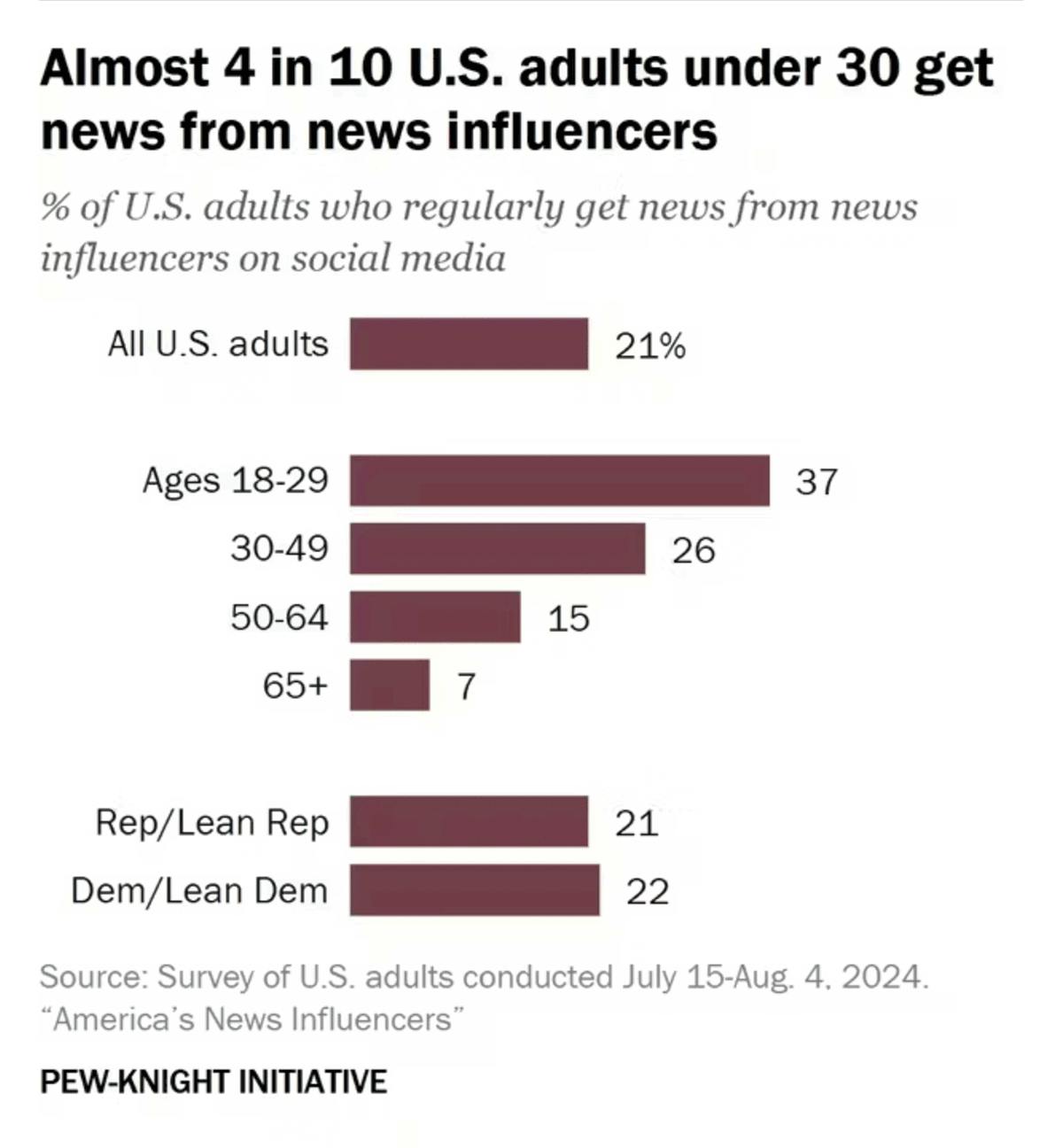Almost 40% of young adults get their news from news
influencers
News influencers are becoming a go-to news source, especially for younger people. People are ditching traditional news for fresh, independent voices.

The 2024 election wasn’t just about politicians — it was also about the people covering them. This year, news influencers have blown up, turning platforms like X and TikTok into political battlegrounds. They’re not your typical reporters, but they’re reaching millions and shaking things up big time.
These influencers are regular people with big followings (100K+), talking about what’s happening in the world. They’re not tied to any news outlet, and that’s part of their appeal — they keep it real.
A recent study from Pew looked at 500 of these influencers, out of 28K social media accounts, and found they’re becoming a go-to news source, especially for younger people. Around 37% of adults under 30 get their news from influencers. For the general population, it’s still 21%. That’s a lot of people ditching traditional news for fresh, independent voices.

It’s pretty simple why people love them: they feel relatable and trustworthy. Around 65% of their followers say influencers help them make sense of the news, and 31% even say they feel personally connected to them. Compare that to the stuffy, detached vibe of regular news, and it’s no surprise these influencers are crushing it.
X is still where most news influencers hang out, with 85% of them active there, compared to Instagram with 50%, and YouTube with 44%.
A slightly bigger chunk of news influencers lean right (27%) than left (21%). It might have something to do with conservatives feeling like social media censors them, prompting them to be more vocal.
Most influencers are men (63%), but TikTok is shaking things up — almost half of TikTok’s news influencers are women. TikTok also stands out as the only site of the five where left-leaning news influencers outnumber right-leaning 28% to 25%.
Most of the influencers are completely independent, with 77% having no ties to traditional media. They’re doing their own thing, and people love it.
Politics is the biggest topic, with 58% of posts focused on elections, government, and policies. But they’re not stopping there. Social issues like race and LGBTQ+ rights make up 18% of posts, while 14% cover global events like the Israel-Hamas conflict.
This isn’t just some online trend — it’s how people are getting their news now. These influencers are rewriting the rules, making platforms like TikTok and X crucial for shaping opinions and sparking debates. If 70% of followers feel the news from influencers is different from what they get elsewhere, you know these creators are doing something right. They’re not just reporting the news— they’re becoming the news.

Highlights the changing dynamics of the media industry, where trust, relatability, and accessibility are becoming just as important as journalistic integrity and thorough reporting.
Around 40% of young adults now turn to news influencers for their daily updates, a trend that reflects a shift from traditional media sources. These influencers, often active on platforms like YouTube, Twitter, and TikTok, provide news in a more relatable, digestible format. While this offers convenience, it raises concerns about the accuracy of the information shared, as influencers may not always adhere to journalistic standards. This evolution challenges conventional media to adapt.
Amazing job, to stay connect with worldwide information you can use different applications. That contains different live tv channels from various countries.
This is a long time coming tbh. The combination of highly partisan mainstream news (e.g. Fox News, MSNBC) and a decentralized web (social media, podcasts, the creator economy, etc) have long set the stage for… I don't know what to call it… "highly partisan decentralized news"? And the best place for that is through influencers.
The rise of news influencers is a game-changer in how we consume information. As platforms like X and TikTok gain traction, these influencers are reshaping the landscape of news reporting. Their independence from traditional outlets allows them to present a more personal, relatable take on events, especially appealing to younger generations. With many followers feeling a deeper connection to influencers compared to traditional media, this shift highlights the growing demand for authentic voices in the political and social discourse. It's clear that news influencers are not just reshaping the way we get our news—they're becoming a central part of the conversation itself.
It’s wild how news influencers are reshaping how we get information! Makes sense though—people want relatable, real voices over the old, traditional ones. Social media is definitely changing the game.